Republican Insiders Still Worried About Donald Trump, Still Don’t Know What To Do About Him
For good reason, many Republicans are worried about the prospect that Donald Trump could end up winning the Republican nominee, but they don't seem to have a plan to stop him.
As Donald Trump’s lead in the polling at the national level, as well as in early primary states such as Iowa, New Hampshire, South Carolina, and Florida, continues a streak that began shortly after he entered the race in mid-June, The New York Times reports that high-level Republicans are becoming increasingly worried that they won’t be able to stop a Trump juggernaut when the primaries actually start and that a Trump nomination could lead to serious problems for the GOP further down the ballot:
WASHINGTON — For months, much of the Republican Party’s establishment has been uneasy about the rise of Donald J. Trump, concerned that he was overwhelming the presidential primary contest and encouraging other candidates to mimic his incendiary speech. Now, though, irritation is giving way to panic as it becomes increasingly plausible that Mr. Trump could be the party’s standard-bearer and imperil the careers of other Republicans.
Many leading Republican officials, strategists and donors now say they fear that Mr. Trump’s nomination would lead to an electoral wipeout, a sweeping defeat that could undo some of the gains Republicans have made in recent congressional, state and local elections. But in a party that lacks a true leader or anything in the way of consensus — and with the combative Mr. Trump certain to scorch anyone who takes him on — a fierce dispute has arisen about what can be done to stop his candidacy and whether anyone should even try.
Some of the highest-ranking Republicans in Congress and some of the party’s wealthiest and most generous donors have balked at trying to take down Mr. Trump because they fear a public feud with the insult-spewing media figure. Others warn that doing so might backfire at a time of soaring anger toward political insiders.
That has led to a standoff of sorts: Almost everyone in the party’s upper echelons agrees something must be done, and almost no one is willing to do it.
With his knack for offending the very constituencies Republicans have struggled with in recent elections, women and minorities, Mr. Trump could be a millstone on his party if he won the nomination. He is viewed unfavorably by 64 percent of women and 74 percent of nonwhite voters, according to a November ABC News/Washington Post poll. Such unpopularity could not only doom his candidacy in November but also threaten the party’s tenuous majority in the Senate, hand House seats to the Democrats and imperil Republicans in a handful of governor’s races.
In states with some of the most competitive Senate contests, the concern is palpable, especially after weeks in which Mr. Trump has made a new series of inflammatory statements.
“If he carries this message into the general election in Ohio, we’ll hand this election to Hillary Clinton — and then try to salvage the rest of the ticket,” said Matt Borges, chairman of the Republican Party there, where Senator Rob Portman is facing a competitive re-election.
Pat Brady, the former state Republican chairman in Illinois, where Senator Mark S. Kirk is also locked in a difficult campaign, was even more direct. “If he’s our nominee, the repercussions of that in this state would be devastating,” Mr. Brady said.
Another Republican strategist in Ohio replied to an email asking about Mr. Trump’s effect in the state by sending a link to a Wikipedia page on the 1964 congressional elections, when Barry Goldwater’s presence atop the Republican ticket led the party to lose 36 House seats.
In Washington, many of the party’s top operatives believe that there is no way even the strongest Senate candidates could overcome the tide if Mr. Trump were leading the ticket.
“Senator Portman is a great example I like to use when talking about this,” said Brian Walsh, a Senate campaign veteran. “He’s very well prepared, has tons of cash in the bank, and he got his campaign organized and up and running early. But if we nominate a bad presidential candidate like Trump, senators like Portman or Kelly Ayotte aren’t going to be able to outrun Hillary by that much. And there goes the Senate.”
Asked about concerns over Mr. Trump’s potential influence on other contests, his spokeswoman, Hope Hicks, said, “I think the facts indicate the exact opposite is true,” and emailed a link to a consumer marketing firm’s assertion that Mr. Trump would ensure the highest general election turnout from Republicans, Democrats and independents alike.
Yet the clamor for a “Stop Trump” effort has become pervasive at the Senate’s highest levels, where members up for re-election are realizing that they can no longer dismiss as strictly theoretical the possibility of his capturing the nomination. Mr. Trump’s persistent ranking at or near the top of the polls is prompting urgent calls for an advertising assault to try to sink his campaign.
“It would be an utter, complete and total disaster,” Senator Lindsey Graham of South Carolina, himself a presidential candidate who has tangled with Mr. Trump, said of his rival’s effect on lower-tier Republican candidates. “If you’re a xenophobic, race-baiting, religious bigot, you’re going to have a hard time being president of the United States, and you’re going to do irreparable damage to the party.”
Mr. Graham recounted separate phone calls with two of the party’s most sought-after donors last week, people who he insisted not be named but who give tens of millions of dollars to Republicans every election year. He said they had expressed alarm at Mr. Trump’s durability and asked what could be done.
“I said, ‘If you care about the future of the Republican Party, and you want to have a viable Republican Party, you better start moving,'” Mr. Graham said. “If they don’t push back, they’ll have nobody to blame but themselves.”
This isn’t the first time that we’ve heard reports of worries from top-level Republicans about the impact that Trump could have not just on the race for the White House but on races further down the ballot in 2016, but like those previous reports it does not seem as though anyone can agree on what, exactly can be done about the Trump phenomenon. Just last week, The Washington Post published a piece that quoted both identified and anonymous Republican donors who expressed similar worries but at the same time indicated that they didn’t have any real idea what to do about Donald Trump going forward. Instead, the consensus that came out of the conversations relayed in that report is that the donors, many of whom continue to sit on the sidelines of the Presidential race, are content to put their trust in the voters to stop Trump and don’t really have a ‘Plan B’ if that doesn’t happen and Trump starts to win primaries and caucuses once voting starts in February. As I noted at the time, the fact that nothing that Trump has done or said over the past five months, no matter how outrageous, has seemed to do much of anything to stop him from at least maintain his lead in the polls, and usually rising whenever he does face criticism, suggests that the ‘do nothing’ approach may not work at all and that it would likely be too late to stop Trump if he actually starts winning once the voting starts.
This new report from The New York Times, though, raises concerns that may spur Republicans alarmed by the rise and continued resilience of Donald Trump to action, namely the prospect that the many gains that the party has made below the level of the White House could be put in jeopardy if Donald Trump ends up somehow winning the nomination or even just tainting the Republican Party no matter who the nominee actually is. The most immediate concern, obviously, is the Senate, where Republicans will be defending the most seats by far in quite some time thanks to their pickups in the 2010 elections. Among those seats are six in states that President Obama won in both 2008 and 2012 — Ron Johnson in Wisconsin, Mark Kirk in Illinois, Rob Portman in Ohio, Pat Toomey in Pennsylvania, Kelly Ayotte in New Hampshire, and Marco Rubio’s seat in Florida, which will be open since Rubio is not running for re-election. To offset potential loses in any of these seats, Republicans are setting their sights on Michael Bennett in Colorado and the seat in Nevada that will be open thanks to Harry Reid’s retirement at the end of the current Congress. With 54 seats in their favor right now, Republicans could afford to lose as many as a net three seats and still maintain a majority in the Senate. Given the fact that polling has already indicated that the seats in Wisconsin and Illinois are in danger, though, Republicans and ill afford to have a candidate at the top of the ticket that polarizes voters and causes people to vote Democratic on their lower ballot because of who is at the top of the Republican ticket. Beyond the Senate, there’s also the unlikely possibility that the Republican majority in the House could be put in danger, and the more likely possibility that an electoral disaster at the top of the ticket could jeopardize the substantial gains that Republicans have made over the past five years in state legislatures and races for Governor.
Given the prospect of losing all of this, one would think that top Republicans would be doing more than talking about what to do about Donald Trump at this point and moving on to, well, actually doing something. With a little over two months to go until the Iowa Caucuses, it would seem fairly clear that the time to act is fast approaching. Yes, there’s a good possibility that a big money campaign against Trump could backfire, or that an effort to pump a lot of money into the race on behalf of the candidate seen as best able to “stop Trump” (whomever that might be) would just end up being ammunition that Trump uses against that candidate as he has in the past and no doubt will continue to do in the future. It strikes me, though, that if these people truly believe that Trump is a danger to the party as a whole then they need to do more than just sit on their hands and fret about what might happen. If that’s what they do for much longer then at some point they could very well wake up and find out it’s too late and that the GOP is racing down the hill toward a probable electoral train wreck next November with Donald Trump driving the train while everyone on the ballot behinds him just hopes they can survive the impact.
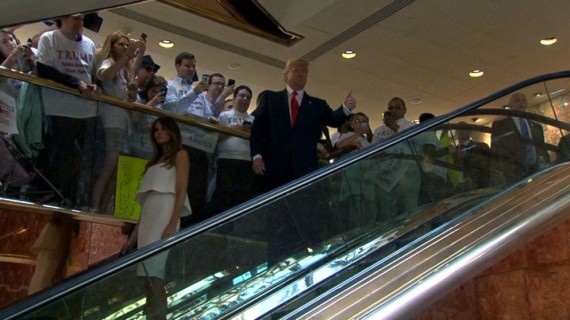

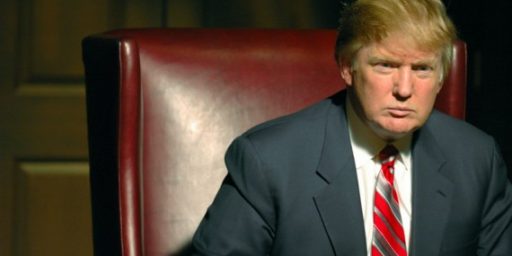
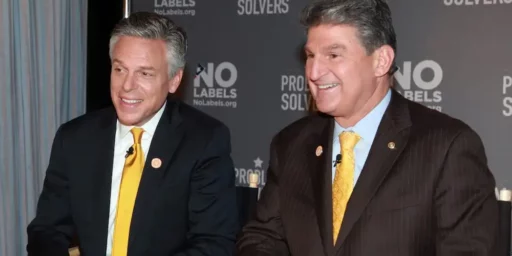
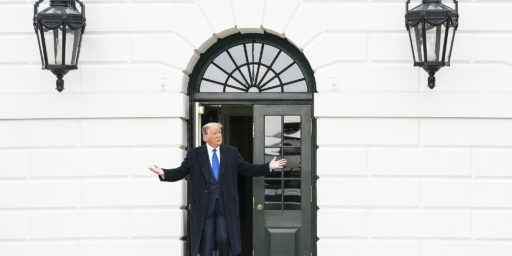

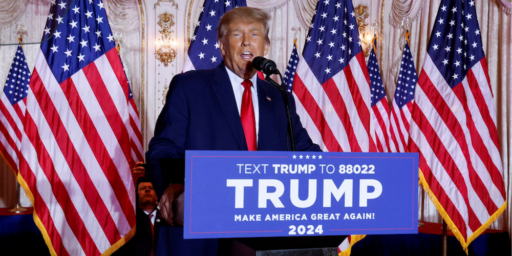
I see lots of hand-wringing, and very little self-awareness that this idiot is what best represents conservatives today.
To my Republican friends: Want a better representation of your beliefs? Stop cynically appealing to the worse instincts in humanity. It’s the same symptom affecting those guys who are shocked, shocked!! when somebody shoots up a Planned Parenthood mumbling something about baby parts.
What can they do? Have the saner candidates try to out-crazy Trump? Act coarser and more vulgar than Trump does? Make blatantly ludicrous claims and promises: “I’m gonna build that wall and make Mexico pay for it? I’, gonna kick Putin’s a$$!” Promise the fan club that he’s gonna look into overturning Roe v. Wade, as he did today?
Trump creates his own reality, and his supporters live in it.
Trump is the second coming of Reagan for the GOP. A lying actor utterly unqualified for high office, and who will doubtlessly be manipulated by political hacks and cronies while in office.
The ghastly irony here is that the only reason this is an issue is because of the fully retarded manner by which the primary process is structured.
Iowa, New Hampshire, South Carolina. Seriously? You couldn’t get a worse collection of demographics lined up in a worse collection of states if you tried. Then to add another layer of retardation, Iowa is a caucus, not a vote, New Hampshire is not strictly a closed primary, South Carolina is an open primary.
If the primary instead consisted of one day of truly closed direct primary voting in all of the large and legitimate states with relevant industries, local economies and demographics (CA, TX, Fla., NY, OH, PA, MI, NJ, GA, NC, MO, CO, WI, MN, WA), or better yet one day of truly closed direct primary voting nationwide, the likes of Trump simply couldn’t happen. Only legitimate national general election prospects could win such a primary process. Clowns, carnival barkers and agent provocateurs, need not apply.
We’re headed for Idiocracy. Literally.
There may be a slight indication that Trump doesn’t have the self-control for the long haul.
The problem is–if you’re going to dazzle the populace with hookers and blow, you’ve got to keep providing them with hookers and blow. Trump may be too narcissistic to keep the “issues” before the Trumpenproletariat.
In short, at some point you’ve got to convince the rubes that you’re not saying “I” but saying “We”.
There is something hugely amusing in the fact that the party of radical individualism is being felled by collective action problem, don’t you think?
@grumpy realist:
There’s a theory to the effect that Trump got into this purely for the ego gratification, and to market his brand, and never expected it to go this far. But it ran away with him, and now he doesn’t know how to extricate himself. Maybe he thought that if he got more and more outrageous, he’d disqualify himself (blaming it on the media misrepresenting him, natch). But that’s not working, because the worse he gets, the more the Trumpkins love him.
Trump just appeared on Alex Jones’ nutty radio show a few hours ago:
Donald Trump Joins Insane Conspiracy Theorist Alex Jones, Who Calls Him The George Washington Of Today
That time Alex Jones warned hallucinogenic clockwork elves were controlling the world
It’s pretty freaking amusing watching the GOP establishment freak out over the voter base they cultivated for decades.
@Bill Lefrak:
Is there any part of this country that you actually like?
@Bill Lefrak: Let’s see….in the Year of Our Lord two thousand and fifteen you discover that the system by which we choose presidents has some elements that are not democratic? Really?
I will stand back in case your exploration takes you to that strange device called the Electoral College.
There’s a wonderful Bob Newhart skit — one of his telephone conversations — where he repeatedly asks “who is this really?” I think of it when I encounter your keyboardarrhea. Are you for real?
@CSK: There’s a theory to the effect that Trump got into this purely for the ego gratification, and to market his brand, and never expected it to go this far
But the one thing I think it is safe to say is that Trump has damaged his brand. His remarks about Mexicans have directly caused some restaurants to pull out from a Trump shopping development in DC, and the PGA seems to be re-thinking scheduling some events at his golf courses. I think long-term his comments cannot possibly help his brand name, and that is pretty much Trump’s most successful part of his business.
So they campaign like they govern?
@Jeremy R: Given the alternate reality that many Trump supporters inhabit, its not really a stretch for him to appear on Alex Jones’ show. Like the one where Trump has never made an inaccurate statement.
“I’ve worked for Mr. Trump now for a long time, and I can tell you that Mr. Trump’s memory is fantastic,” said Cohen, who is an attorney for Trump. “I’ve never come across a situation where Mr. Trump has said something that’s not accurate.”
“Seriously?” Tapper responded.
At least Cohen gets paid very well to live in this alternate reality, what excuse do Trump’s supporters have?
But when Jake Tapper starts to call you on BS you know you’ve hit rock bottom on the BS meter.
@SenyorDave:
I think he may have failed to anticipate the brand damage, which probably says something about his much-vaunted business acumen.
@James Pearce: Galt’s Gulch.
I suggest that they begin making their peace with the idea of voting for Hillary in the general.
There are two ways:
1. Find someone better to run. The process is turning off the best and the brightest.
2. Stop deeming party primaries elections. This is a recent development which may have been a terrible idea. Yeah, it gets a lot of press, yeah, that press is great for Free $peach gathering, but what good is it if it results in somebody like Trump winning? The old “smoke filled rooms” for the most part kept the clowns at bay and now that is all there are. The Constitution set up a process to isolate the process from raw democracy, it failed miserably from day one but the intent is clear. It’s as American as apple pie to have the elites pick their top dog for us all, so why not for a party of Americans?
@humanoid.panda:
Ha! Funny.
Although the other day he was moaning about people who live in Aspen and Vail, so I think the Rocky Mountains are on his “hate” list.
@dazedandconfused:
The process of choosing nominees for parties has nothing to do with the Constitution, which never mentions political parties at all (and indeed the Founders were opposed to the idea of parties, at least initially). It’s a process that evolved over time. Originally it involved members of Congress, then the convention system was developed, then primaries were gradually established in various states, then finally in 1972 they became central.
You can debate which system was better (personally I like the idea of putting the decision more in the hands of voters, and I actually agree with Bill LeFrak in preferring a national primary or at least to begin with states that are more representative of the country than Iowa or New Hampshire), but none of this was due to some sweeping vision by the authors of the Constitution.
– Linsey Graham. But you’ll do great in the Republican primaries.
I should be taking all of this more seriously, what with the Republican Party having become the single greatest current threat to the Republic. But dyam it’s fun to watch them sew coattails on Hillary’s pantsuits. And even better is the schadenfreude to be had from watching the Doctors Frankenstein cower in fear of the monster they created.
@Kylopod:
I’m unconvinced the Constitution is irrelevant to selecting the Chief Executive, but moreover I didn’t cite it as authority, but for example. You may believe different but in context of Trump gaining the nomination…“How’s that workin’ out for ya?”
@dazedandconfused:
When did I say it was irrelevant? I was talking about the nomination process within parties, not the general election, which of course the Constitution deals with. What the Constitution doesn’t deal with at all is parties. The closest it gets is the 12th amendment, which was in part an attempt to deal with some of the unanticipated problems generated by parties and their effect on the presidency. But there’s absolutely nothing about the way parties select their nominees–that’s purely custom. There’s literally nothing in the Constitution stopping the Democrats or the Republicans from choosing their nominee by having the candidates draw straws, or through a raffle or through trial by combat–or for that matter through a single national primary held on one day where the winner is decided purely by voters.
If most Republican voters want Trump as their nominee (and there’s no evidence they do–30% isn’t “most”), then that’s who they deserve. The idea that elites should be protecting voters from their desired candidates is deeply undemocratic.
@Kylopod:
The Constitution isolates the process of picking the Chief Executive from populism specifically, and the political parties used to do the very same thing until recently. See the nomination of James Garfield as an example.
The Electoral College was created to prevent populism from producing a dangerously silly or radical chief executive so the logic of letting populism select candidates for party’s as SOP is unclear to me is all. I am well aware it does not mention parties.
Only a very small percentage of Republicans vote in primaries so their results don’t equate automatically to what most Republicans want. This is one of the bug-bears of populism. Another is the sort of person who is attracted to the process. There must be a million better Republicans for that job than Trump, Cruz, Carson, Rubio, and on down the list.
@dazedandconfused:
Actually, the Electoral College, like the Senate, was designed to give the Southern states enough power to maintain the institution of slavery. From the beginning, it was a compromise opposed by many of the Founders.
Even then, the EC worked so badly at first that they had to create a new amendment, the 12th, little over a decade after the Constitution’s ratification, just to make the process workable.
In general, the EC ended up working nothing like the Founders envisioned. The original idea was to have a set of electors chosen by state legislators who would convene and independently decide on a president. It resembled nothing like the way it works today, where citizens vote for electors who are pledged in advance to particular candidates from particular parties.
Furthermore, the Founders lived at a time when the concept of a “state” was very different from the way we think of it today. They’d designed the system as a replacement to the Articles of Confederation, where the US was practically a series of countries with a very weak central authority. The Constitution strengthened the power of the federal government, but even then it was nothing like today. Thomas Jefferson referred to Virginia as “my country,” and the term United States was treated as a plural until around the Civil War. (And if you think about it, in modern English the word “state” is nearly always a synonym for country, except in federalist systems. That isn’t a coincidence but an artifact of the way these systems, and the US in particular, evolved.)
The effect of the EC in modern times isn’t a body of elites choosing the president, it’s an arbitrary redistribution of votes that gives disproportionate power to low-population states–definitely not what the Founders had in mind. So please spare me this “wisdom of the Founders” crap that people use to retroactively defend institutions that developed more by historical accident than some grand vision.